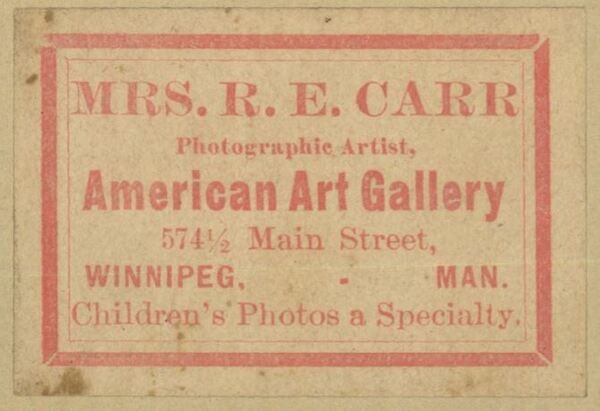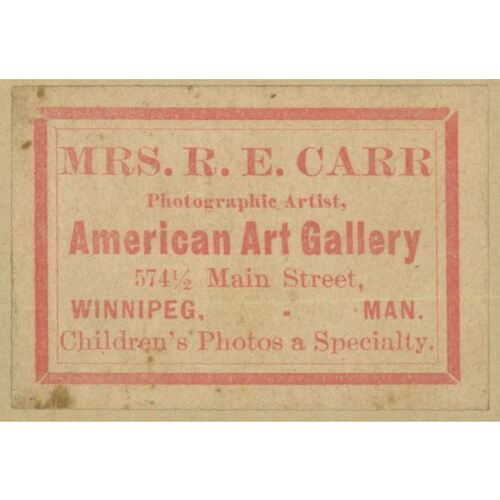
Source: Link
WATSON, ROSETTA ERNESTINE (Carr), photographer and businesswoman; b. 1845 in Drummond Township, Upper Canada, daughter of Henry Watson, a farmer, and Rosetta Goodall; m.— Carr; they had no children; d. 6 July 1907 in Ottawa.
Rosetta Ernestine Watson’s paternal grandfather was a British soldier who had moved to Drummond Township after the War of 1812. At the time of the 1871 census she was still unmarried and living with her family. She trained as a photographer in New York City, in New Haven, Conn., and at the Ottawa studio of William Notman*. In 1884, a year after moving to Winnipeg, Rosetta Carr purchased Searl and Company, the photographic business of George Searl. In the local press the buyer was not identified and the company was renamed the American Art Gallery rather than after its new owner, probably because it was unusual for businesses to be owned by women. She was later referred to as a widow, but the date of her marriage and information on her husband remain elusive. She advertised “the services of a first-class artist from Cleveland, Ohio” (it is not known if this reference was to herself or another employee), and the most complete studio in Winnipeg. Searl continued on staff for several years and there were other employees. Carr acted as “photographic artist” with skills in different techniques and poses, and in the finishing of pictures with watercolours and oils.
During the boom years of the early 1880s the number of photography firms in Winnipeg more than doubled, and competition was keen. Carr therefore had to maintain high standards. She demonstrated familiarity with dry-plate printing, which was new in Winnipeg, and later adopted improved methods such as the photo-crayon process and platinotypes. Trips east involved visits to galleries in the United States and central Canada for information and occasionally the recruitment of personnel. To maintain a thriving business she used various marketing devices: special prices for babies and children, gifts, coupons, trading-stamps, reduced rates on holidays, and special programs which included free exhibitions and music. The amenities of the gallery also attracted patrons. It had handsomely furnished parlours, large, excellently lit studios, and dressing-rooms and work-rooms equipped with “every convenience and the latest apparatus.” In 1891 the “homelike” parlours were refurnished.
Carr’s strength, however, lay in the quality of her work, especially her portraits. Admired for their easy poses, natural expressions, and skilful shading, these portraits ranged from pictures of children to photographs of such public figures as Premier John Norquay* and Roman Catholic archbishop Alexandre-Antonin Taché* of St Boniface. Among the many groups were hospital nurses and college students, tobogganists and hockey players, and societies of all types. She also photographed landscapes of the country between Port Arthur (Thunder Bay), Ont., and the Rockies. Often she entered exhibitions. She took pride in a diploma and medal won at the Colonial and Indian Exhibition in London, England, in 1886 and frequently received prizes in the art section of the Winnipeg Industrial Exhibition. In 1893, because she had been granted the exclusive right to photograph the exhibition grounds, her colleagues boycotted the show. The sole entrant in the professional class, she displayed several hundred works and won all the prizes.
Carr’s last years in business were dogged by ill health. She sold the American Art Gallery in 1899 and later moved to Ottawa. At her death she was remembered for her reputation as a fine photographer, her business acumen, and her ability to prosper during 16 years of fluctuating economic conditions in Winnipeg.
Photographs taken by Rosetta Ernestine Carr are held by the PAM.
AAC, Diocese of Ottawa Arch., Perth, Ont., reg. of baptisms, 1845. PAM, ATG 25, file 4916. Private arch., Elizabeth Blight (Winnipeg), Elizabeth Blight, “Early photographers in Winnipeg” (typescript, 1990). Daily Nor’Wester (Winnipeg), 17 Dec. 1894. Manitoba Morning Free Press, 20 Dec. 1886; 4 Jan. 1887; 9 Sept. 1889; 5 Aug. 1890; 28 Sept., 1 Oct. 1891; 23 July 1892; 27 June, 25 July, 8, 10 Oct., 10 Dec. 1894; 22 Nov. 1897. Manitoba Sun (Winnipeg), 20 July 1888. Perth Courier, 29 Sept. 1893. Winnipeg Siftings, 1 March 1884. Winnipeg Tribune, 1 Aug., 14 Sept. 1891; 15 April, 14, 18, 24 July, 2 Oct. 1893; 23 Feb., 16 May, 24, 25 July, 16 Oct., 3 Nov., 19, 22 Dec. 1894; 15 April, 6 July 1895; 25 April, 4 May 1896; 28 Oct. 1897; 18 April, 22 Sept., 15 Oct. 1899; 12 July 1907. Directory, Man., 1883–93. R. A. Greenhill, Early photography in Canada ([Toronto, 1965]). Portrait of a period: a collection of Notman photographs, 1856–1915, intro. E. A. Collard, ed. J. R. Harper and S. G. Triggs (Montreal, 1967).
Cite This Article
Virginia G. Berry, “WATSON, ROSETTA ERNESTINE (Carr),” in Dictionary of Canadian Biography, vol. 13, University of Toronto/Université Laval, 2003–, accessed April 2, 2025, https://www.biographi.ca/en/bio/watson_rosetta_ernestine_13E.html.
The citation above shows the format for footnotes and endnotes according to the Chicago manual of style (16th edition). Information to be used in other citation formats:
| Permalink: | https://www.biographi.ca/en/bio/watson_rosetta_ernestine_13E.html |
| Author of Article: | Virginia G. Berry |
| Title of Article: | WATSON, ROSETTA ERNESTINE (Carr) |
| Publication Name: | Dictionary of Canadian Biography, vol. 13 |
| Publisher: | University of Toronto/Université Laval |
| Year of revision: | 1994 |
| Access Date: | April 2, 2025 |



